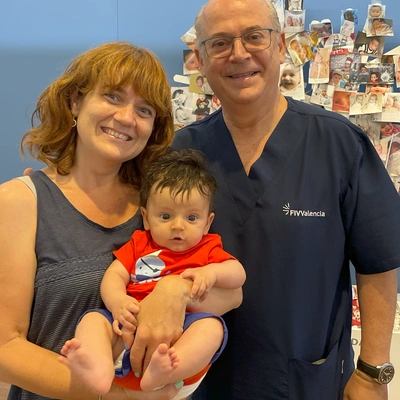Your Journey Begins Here: Choose Your Path
100% Focused on You
Treatment Guides: Legal Aspects
At FIV Valencia, we offer treatments to all types of families within the Spanish legal framework, including heterosexual couples, same-sex couples, and single women. Treatments are also available to transgender individuals and men seeking to preserve their fertility.
Key Legal Conditions to Know Before Starting Assisted Reproduction:
Age Limit
Anonymous Donation
Embryo Transfer
Embryo Donation
Your First Visit to FIV Valencia
We aim to make your first visit to FIV Valencia a time when you feel heard, understood, and well informed. During this session, we will review your medical history, discuss your options, and create a personalised treatment plan tailored to your needs.
Duration: 1 hour
Specialist: You will meet with one of our doctors specialising in Assisted Reproduction.
During this comprehensive evaluation, we will:
We will provide results during this visit, enabling us to work with you to develop a personalised plan from day one.
100% Focused on You
- Perform a blood test to measure anti-Müllerian hormone (AMH) levels, assessing ovarian reserve and fertility potential.
- Conduct a semen analysis if you have a male partner.
- Complete a detailed medical history.
- Produce a 3D gynaecological ultrasound.




Infertility Diagnosis: Common Factors
Infertility often has multifactorial causes. Different aspects may contribute to the diagnosis, and considering all of them helps us devise the most appropriate treatment strategy for each case:

- Polycystic Ovary Syndrome (PCOS): Affects hormone levels, causing irregular periods or lack of ovulation, making natural conception difficult.
- Endometriosis: A condition where tissue similar to the uterine lining grows outside the uterus, causing pain and affecting fertility.
- Male Factor Infertility: Issues like low sperm count, poor motility, or abnormal morphology can impede fertilisation. Our specialists in urology and fertility are here to help.
- Tubal Factor Infertility: Blocked or damaged fallopian tubes prevent eggs and sperm from meeting, often due to infections or surgeries.
- Reduced Ovarian Reserve or Poor Egg Quality: Age diminishes the quantity and quality of a woman’s eggs, particularly after 35–37 years. Early menopause can accelerate this decline.
- Uterine Fibroids: Non-cancerous growths in the uterus that can interfere with embryo implantation or cause miscarriage.
- Uterine Malformations: Abnormally shaped uteri make implantation and embryo development more challenging.
- Ovulatory Dysfunction: Irregular or absent periods caused by hormonal imbalances complicate the timing of Assisted Reproduction treatments.
- Genetic Diseases: Preimplantation Genetic Testing (PGT) and genetic compatibility tests allow for safe fertility treatments for individuals with genetic abnormalities.
- Unexplained Infertility: In some cases, no medical explanation for infertility can be found, despite extensive testing.
Testimonials
Contact Us
The FIV Valencia team is here to support you on your journey to having your baby. Contact us today!








